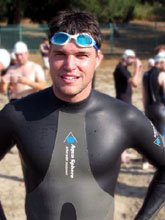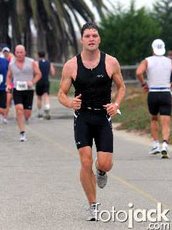Wednesday, December 05, 2007
Nature: ONE; Nurture: ZERO
In Andrew Niccol's 1997 sci-fi movie Gattaca, Ethan Hawke plays an aspiring astronaut in a dystopian future where the quality of your life is dictated by the quality of your genes. It's a world where, "with the right helix tucked under your arm, you can go anywhere." Unlike his brother, who was engineered to be a perfect combination of his parents' best features, Hawke's character was conceived the old-fashioned way (in the back of a convertible), and is therefore born with a weak heart, which automatically disqualifies him from the astronaut program.
But his desire to reach the stars burns strong and bright, and he contrives a way to take on the identity of the genetically superior but wheelchair-bound Jude Law, who sells him his fingerprints, a blood sample, and a medical-bag full of other distinguishing features for a hefty percentage of Hawke's earnings. Some diligent workouts stave off his heart troubles whilst some fancy evasive moves keep the man off his tail, and things wind up going pretty well for him. Law has the genes, but he lacks the heart and soul to get the job done; Hawke lacks the genes but he's got the fire. As the poster said, 'There is no gene for the human spirit.'
As my occasional references suggest, I'm a fan of this movie, I suppose in part because it reinforces my conviction that our genes don't tell our whole story: we're in charge of our destiny, thank you very much, and what we do and how we act and what we accomplish is all on our shoulders, not predestined by our genes or by anything or anyone else. In a way, Gattaca describes the whole ethos of working out: put in the time and the effort, and you can create a new self. It's all up to you.
I suppose that's why I was so taken by a story in a recent issue of The New Yorker (abstracted here). The story, by Stephen S. Hall, describes the development and gradual acceptance of a hypothesis by scientist David J.P. Barker that "adult disease is linked to pre-natal and early post-natal life." Barker based his hypothesis on some data that suggested that being born small (under 5.5 pounds in this study, though premature babies were deliberately excluded from the research) increased one's chances of contracting heart disease in adulthood.
Hall describes how Barker's hypothesis initially met with a fair amount of resistance, primarily because of the anti-Gattaca impulse: science is great, of course, but we want to believe that it doesn't tell us everything. That if we contract heart disease, it may be a bum deal, but darn it, maybe we should have laid off the french fries and mayo. In direct contrast to the oppressive powers-that-be in Niccol's film, health officials had been laboring to get the message out that adult behaviors determined health and longevity. Now here was a study--and a convincing one--that suggested that we might not be as fully in control as we once believed.
Elsewhere in the article, Hall cites research that suggests that adult health may be influenced to a shocking extent by the quality of your mother's diet in the four days following conception: in theory, the developing embryo sets the pace for its growth rate during this crucial period, and if nutrients are scarce, it puts the brakes on its development (it must be noted that those results were taken from an animal study).
But the supporting data for Barker's theories came hard and fast, and now, as the abstract states, they're a new kind of orthodoxy. Score one for the Gattacists.
I suppose I feel a little pang when I read Hall's article, but I also realize that we still don't know the whole equation. There's a complex relationship at work here, and cheesy though it may be to say, the human spirit is unquestionably a wild-card player that very well might trump the whole game: I'm reminded again of cancer survivors I know who have gritted their way back to health, and of friends and clients who have lost enormous amounts of weight, beating genetics and ubiquitous temptation through constant vigilance and a thousand daily acts of will. Our genetic hand plays a big role in our health and fitness, certainly, but in truth, we can't deny the power of our own nature any more than we can deny the power of nature itself.
Subscribe to:
Post Comments (Atom)




3 comments:
I'm sure someone's looking for the genes for perseverance, determination, strength of will, patience, etc. even as we speak.
Coming soon -- Gattaca II: The Gene for Fate
Excellent post - As always.
Pete Thomas
http://WinningMan.com
http://Flickr.com/photos/Winningman/sets/
Andrew,
Long time reader, first time commenter (19 year old male, in Ann Arbor, MI).
I also have mixed feelings when I hear about research like this. Discovering new things about how the body functions is always great, but I worry that findings about long term effects from youth and before will always be blown out of proportion as a fatalistic excuse for unhealthy habits.
I admit I'm critical of my own genes, given I have a minor, yet frustrating, defect in my rib cage; my sternum sinks in and my lower ribs stick out. But I've got to remember I'm pretty blessed for being over 6 feet tall and a relatively easy gainer without making it too hard to stay trim (hope to hang onto that in the future, I'm only 19).
You and anyone who finds this stuff interesting should check out some of the writings by another at the New Yorker, Malcolm Gladwell, author of Blink. Specifically what he wrote about genes and the unspoken racial advantages/disadvantages in sports (way back in 1997) here: http://www.gladwell.com/1997/1997_05_19_a_sports.htm
Keep up the great work.
-Danny
Post a Comment